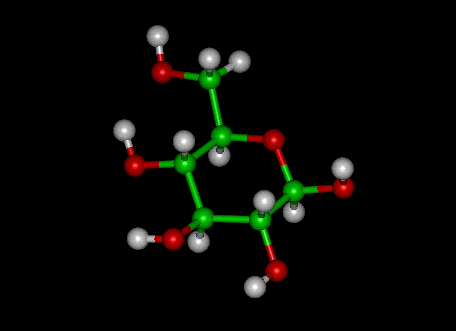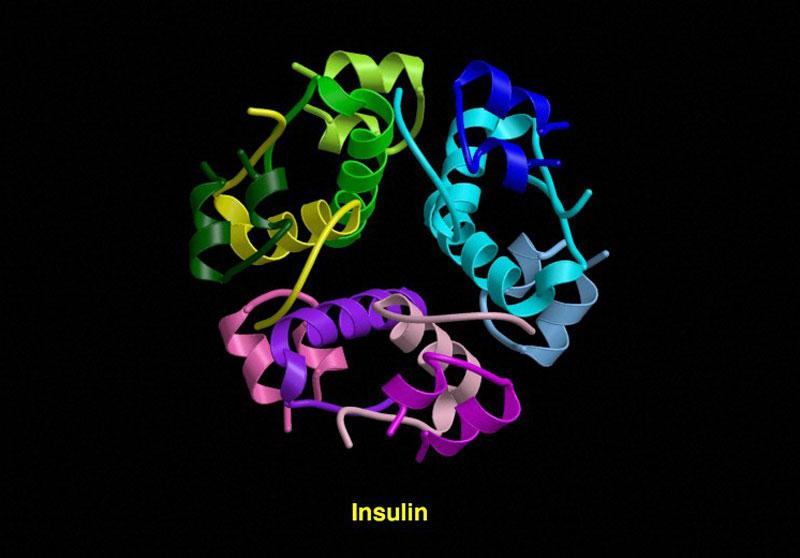Man is a social animal, so there is an evolutionarily appropriate social bias against a member of the tribe who is eating more than their fair share, and not pulling their weight - that person raises the risk of starvation for the entire tribe. That is likely the origin of the concept of sins of gluttony and sloth, they are hard wired into us, even deeper than racism. This appears to be why it is easy for lazy thinkers to fall into viewing things through that prism.
For many it starts in the womb. A glucose molecule is small, C6 H12 O6, it passes the placental barrier between mum and bub easily … which makes sense, glucose is pure energy substrate.

Circulating insulin, however, is a massive baroque structure, with 6 individual insulin molecules each made up of 2 arms each containing 51 amino acids. Each of those amino acids is larger than a glucose molecule. The formula of an insulin molecule is C257 H383 N65 O77 S6 and it’s molecular weight is around 5800g per mole (glucose is 180g/mol).
Insulin looks like a dozen olympic ribbon twirling gymnasts … on acid, viewed through a keleidoscope.
Insulin doesn’t have any transports to get across the placental barrier, and at that size it’s not diffusing through any membrane. So depending on what the mothers glucose levels do, the child’s pancreas has to mature very quickly to keep up with the load.
This is likely the beginning of insulin resistance for most type 2 diabetics. If mom has a low and slow bath of glucose for the child to develop in then the child’s pancreas develops normally, if mum is on the glucose roller-coaster however, then the developing pancreas has to become acclimated to making heroic amounts of insulin and the child’s tissues need to learn to become insulin resistant to protect itself.
That’s going to happen 20-30 years before obesity starts, a body gradually making more and more insulin. During adolescence most hyperinsulinaemics don’t become obese because their metabolic rates increase … it’s when that slows down in their 20s and 30s that the chickens come home to roost.
And it’s only once the person hits their personal fat threshold sometimes decades years after they had started to pack on fat that they begin to lose glucose stasis - which is where we diagnose Diabetes.
And then someone with a poor understanding of what is going on will observe “Look at that glutton, he’ll get diabetes if he keeps eating like that”. Classic “post hoc” logic fallacy, assuming that because effect B (diabetes) happened AFTER effect A (obesity), therefore A was the cause. In fact both happened decades after cause C (hyperinsulinaemia).
Yes a person who is obese eats more, necessarily. They also do less exercise. Of course they do, duh. But is it possible to say that those are CAUSES or EFFECTS?
It’s one of those logic traps, that falls into our deep prejudices against gluttony & sloth in a tribe member.
You can take the easy way out and say, oh well that person is just sinful and the horrible diabetes that is headed their way is a just punishment for that moral turpitude. All wrapped up into a nice neat moralistic package, with the bonus that if you yourself are not obese you can pat yourself on the back for your work ethic, self control, discipline, thrift, moral righteousness.
The problem is that all these complex mythical behaviors don’t explain the fundamental biochemical paradox of the man who is at once obese, hungry and lethargic.
You have to invent complex behaviors that are antithetical to the organisms survival. “Some people are just lazy” is an example of this. Why some people, why not everyone? Isn’t energy conservation an optimal posture for an organism?
There is another simpler explanation that explains the observations. Elevating insulin inhibits the release of stored energy from body fat, and the use of fat as a substrate for making energy. Lowering insulin enables the release of energy from storage, and use of it as a substrate for making energy.
Feasting = insulin  fat use
fat use 
Fasting = insulin  fat use
fat use 
We apparently evolved to cycle insulin through these feast-fast cycles.
Any environmental stressor that keeps insulin elevated (Industrial supply of sugar & starches, permanent feeding, circadian disruption) keeps stored energy from contributing to available energy - driving hunger and lethargy and obesity. Eventually too much insulin for too long feeds a vicious cycle of insulin begetting resistance begetting more insulin. At some point body fat can take no more energy and it overflows into circulation driving up LDL among other things. But now insulin is hopelessly elevated permanently with no chance for it to come done short of an heroic intervention - like bariatric surgery, or Keto/fasting.

 Not that it took a lot of convincing, you know… But I love to hear explanations of things. It makes me understand things better and I feel like I can just make it part of me more.
Not that it took a lot of convincing, you know… But I love to hear explanations of things. It makes me understand things better and I feel like I can just make it part of me more.


 fat use
fat use 